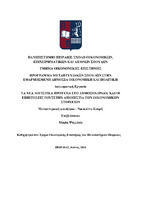Τα νέα Λογιστικά Πρότυπα στο Δημόσιο (IPSAS) και οι επιπτώσεις τους στην αξιοπιστία των οικονομικών στοιχείων
The new Public Accounting Standards (IPSAS) and their effects on the reliability of financial data

View/
Keywords
Διεθνή Λογιστικά Πρότυπα Δημοσίου Τομέα ; IPSAS ; Οικονομική σταθερότητα ; Προκλήσεις ; ΟφέληAbstract
The International Public Sector Accounting Standards (IPSAS) are the only internationally recognized accounting standards applied in the public sector. They were designed to offer valid information, ensure accurate data and produce true data, with the aim of providing reliable and transparent fiscal information, both domestically and internationally. The public debt crisis forced governments to clearly demonstrate their intentions for financial stability and to adopt robust accounting standards, with the aim of a stricter and more transparent process for submitting fiscal data. In the present study, which seeks to investigate the effects of these standards on the reliability of financial data, a quantitative survey was conducted with 103 participants. Regarding the distribution of the sample, 74 work in the public sector, with a significant number of them in financial services, and the remaining 29 work mainly in financial departments of the private sector. With reference to the results of the research, the participants, with a catalytic majority, demonstrate the necessity of implementing in the public sector, regardless of cost, reliable accounting standards, which will contribute to the economic stability of the country and develop it into a strong pole of attraction for investments and foreign capital. Regarding the challenges in the IPSAS implementation process, the largest percentages record, the understaffing of the financial services, the lack of specialized accounting knowledge, the lack of trained staff, the lack of knowledge about the transition process to the new accounting framework and the lack of appropriate accounting systems. As far as the benefits are concerned, the comparability of economic sizes, within and outside borders, the transparency of public accounts, the reliability of economic results and the strengthening of government bond investments occupy higher percentages. Finally, the research participants present strong internal correlations between the variables that demonstrate reliable comparisons of the country's economic indicators, the positive country's rating by international agencies, the high quality of fiscal information and the useful information for decision-making.


